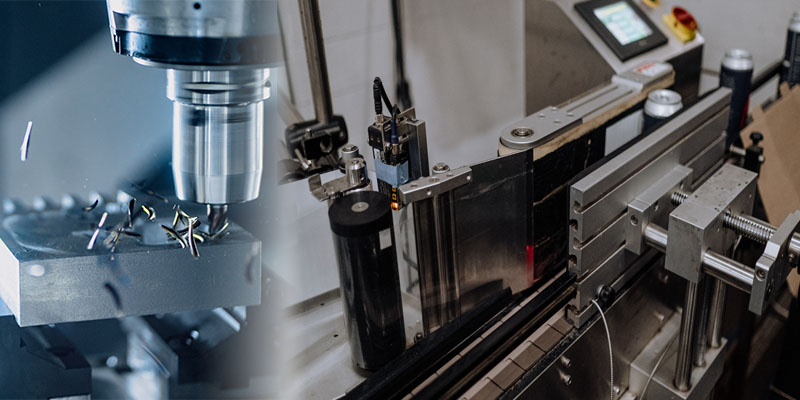The automotive industry is one of the most dynamic and rapidly evolving sectors, continuously pushing the boundaries of technology to deliver better, safer, and more efficient vehicles. Among the technological advancements driving this progress, CNC (Computer Numerical Control) machining has emerged as a game-changer. CNC machining has revolutionized the way automotive components are designed, prototyped, and manufactured, leading to significant improvements in quality, efficiency, and innovation,CNC technology is playing an increasingly crucial role in shaping the vehicles of tomorrow. In this post, we will explore the revolutionary role of CNC machining in the automotive industry.
1. Precision Engineering for High-Performance Components
One of the most critical demands of the automotive industry is the production of high-performance components with extreme precision. The safety, reliability, and efficiency of a vehicle largely depend on the accuracy of its parts, especially in key systems like the engine, transmission, and braking. CNC machining excels in delivering precision, with the ability to produce parts with tolerances as tight as a few micrometers.
Engine Components:
CNC machining is instrumental in the production of intricate engine components such as cylinder heads, pistons, and crankshafts. These parts require tight tolerances to ensure optimal performance and longevity.
Transmission Systems:
The gears, shafts, and other components in transmission systems need to be machined with high precision to ensure smooth operation and minimal wear. CNC machining provides the accuracy required to produce these parts to exact specifications.
Braking Systems:
The safety of a vehicle heavily relies on the braking system, which includes components like brake discs, calipers, and pads. CNC machining ensures that these parts are manufactured with the precision needed to deliver consistent and reliable braking performance.
2. Rapid Prototyping and Innovation
The automotive industry is known for its rapid innovation cycles, with manufacturers constantly developing new models and features to stay ahead of the competition. CNC machining plays a crucial role in this process by enabling rapid prototyping.
Accelerated Development:
CNC machining allows automotive engineers to quickly produce prototypes of new components, enabling faster testing and iteration. This speed is essential for bringing new designs to market more quickly and efficiently.
Design Flexibility:
CNC machining offers unparalleled flexibility in terms of design. Complex geometries that would be difficult or impossible to achieve with traditional manufacturing methods can be easily produced using CNC machines. This capability empowers designers to explore innovative ideas without being constrained by manufacturing limitations.
Cost-Effective Prototyping:
While traditional prototyping methods can be time-consuming and expensive, CNC machining offers a more cost-effective solution. The ability to produce accurate prototypes quickly and at a lower cost enables automotive companies to experiment with different designs and make improvements before committing to mass production.

3. Mass Production with Consistency and Efficiency
While precision and prototyping are crucial, the automotive industry also requires the ability to produce millions of identical parts consistently and efficiently. CNC machining is ideally suited to meet these demands.
High Production Volumes:
CNC machines can operate continuously, 24/7, to produce large quantities of parts with consistent quality. This capability is essential for meeting the high production volumes required in the automotive industry.
Reduced Lead Times:
The automation and precision of CNC machining significantly reduce lead times in production. Parts can be manufactured quickly and efficiently, allowing manufacturers to meet tight production schedules and respond to market demands more rapidly.
Consistency and Quality Control:
CNC machining ensures that every part produced is identical to the last, meeting the strict quality control standards of the automotive industry. This consistency is crucial for maintaining the reliability and safety of vehicles on the road.
4. Material Versatility and Advanced Manufacturing Techniques
The automotive industry uses a wide range of materials, from traditional metals like steel and aluminum to advanced composites and plastics. CNC machining is versatile enough to handle this diverse array of materials, making it an indispensable tool in automotive manufacturing.
Metal Components:
CNC machining is highly effective for cutting and shaping metals, including aluminum, steel, titanium, and more. These metals are commonly used in structural components, engine parts, and other critical systems in vehicles.
Plastics and Composites:
With the growing emphasis on lightweight materials to improve fuel efficiency and reduce emissions, plastics and composites are becoming increasingly important in automotive design. CNC machining can accurately process these materials to create components like dashboard panels, interior trim, and body parts.
Advanced Techniques:
CNC machining is also compatible with advanced manufacturing techniques such as 5-axis machining, which allows for the creation of highly complex parts with intricate geometries. This capability is essential for producing modern automotive components that require precision and complexity.
5. Impact on the Future of the Automotive Industry
As the automotive industry continues to evolve, the role of CNC machining is expected to become even more significant. With the rise of electric vehicles (EVs), autonomous driving, and other technological advancements, the demand for precision-engineered components is only increasing.
Electric Vehicles:
EVs require specialized components, such as battery housings, electric motor parts, and cooling systems. CNC machining is crucial for producing these components with the required precision and quality.
Autonomous Vehicles:
The development of autonomous vehicles relies on advanced sensors, cameras, and computing systems, all of which require precise, reliable components that can be produced using CNC machining.
Sustainability and Efficiency:
CNC machining is also contributing to sustainability efforts in the automotive industry. By reducing material waste, improving production efficiency, and enabling the use of lightweight materials, CNC machining supports the industry’s goals of reducing its environmental impact.
Conclusion
CNC machining has revolutionized the automotive industry by providing the precision, flexibility, and efficiency needed to produce high-quality components. From rapid prototyping to mass production, CNC machining plays a vital role in every stage of automotive manufacturing, enabling the industry to innovate, improve, and meet the demands of the modern market. As the automotive industry continues to evolve, CNC machining will remain at the forefront, driving progress and ensuring that vehicles are safer, more efficient, and more advanced than ever before.



